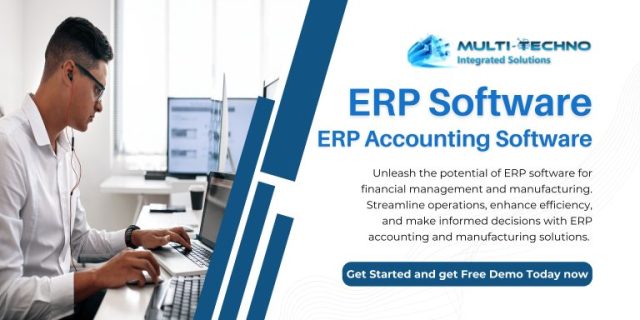Introduction Of ERP Software
In today’s fast-paced business landscape, organizations strive for efficiency, productivity, and streamlined operations. To achieve these objectives, many companies turn to Enterprise Resource Planning (ERP) software solutions. ERP software serves as a centralized system that integrates various business processes and departments, enabling seamless collaboration and data sharing. In this blog post, we will delve deep into the world of ERP software, with a specific focus on ERP accounting software and manufacturing ERP software. We will explore their functionalities, advantages, and how they empower businesses to optimize their financial management and manufacturing operations.
Understanding ERP Software
Enterprise Resource Planning (ERP) software is a comprehensive business management solution that combines multiple functionalities into a single system. It acts as a digital backbone, connecting various departments such as finance, sales, procurement, manufacturing, and human resources. The primary purpose of ERP software is to streamline and integrate business processes, facilitating data flow and providing real-time insights for informed decision-making.
ERP software encompasses a wide range of features and modules that support different areas of a business. These modules can include finance and accounting, human resources, supply chain management, customer relationship management, manufacturing, and more. By consolidating data and processes into a unified system, ERP software eliminates data silos and enhances cross-functional collaboration.
If Your Need to Learn the Complete ERP Software so you also Check our Youtube Channel And Also Subscribe to our Channel
The key benefits of ERP software include:
- Improved Efficiency: ERP software automates routine tasks, reduces manual data entry, and minimizes duplication of efforts. This efficiency boost allows employees to focus on value-added activities and enhances overall productivity.
- Enhanced Visibility: With ERP software, businesses gain real-time visibility into their operations. They can monitor key performance indicators (KPIs), track inventory levels, manage customer orders, and analyze financial data, among other insights. This visibility enables organizations to make informed decisions and respond quickly to market changes.
- Streamlined Processes: ERP software integrates various departments and eliminates data redundancy. This integration improves communication and collaboration, streamlines business processes, and ensures consistency in data across the organization.
- Data-driven Decision-making: ERP software provides accurate and up-to-date data, enabling organizations to make data-driven decisions. With access to real-time information, businesses can identify trends, forecast demand, optimize resource allocation, and mitigate risks effectively.
- Scalability and Adaptability: ERP software is designed to grow with businesses. It can handle increased transaction volumes, support additional users, and accommodate changing business needs. This scalability and adaptability make ERP software a long-term investment for organizations.
ERP Accounting Software
ERP accounting software is a crucial component of any ERP system as it helps organizations manage their financial activities efficiently. It encompasses various modules, including general ledger, accounts payable and receivable, financial reporting, budgeting, and asset management. Let’s explore the key benefits of ERP accounting software in detail:
- Streamlined Financial Operations: ERP accounting software automates core accounting tasks, such as invoicing, billing, and payment processing. This eliminates manual data entry, reduces errors, and accelerates financial workflows, leading to increased productivity.
- Accurate Financial Reporting: With real-time access to financial data, organizations can generate accurate reports and gain insights into their financial performance. This facilitates better decision-making and ensures compliance with regulatory requirements, enhancing transparency and accountability.
- Improved Cash Flow Management: ERP accounting software provides visibility into cash flow, enabling organizations to effectively manage cash inflows and outflows. By optimizing working capital, reducing financial risks, and enhancing liquidity management, businesses can achieve better financial stability.
- Enhanced Auditability and Compliance: ERP accounting software maintains a comprehensive audit trail, ensuring transparency and traceability of financial transactions. This helps organizations meet regulatory compliance standards, simplifies the auditing process, and reduces the risk of financial irregularities.
- Integrated Financial Data: ERP accounting software seamlessly integrates financial data with other business processes, such as sales, procurement, and inventory management. This integration enables real-time visibility into financial impacts and enhances decision-making across the organization.
Manufacturing ERP Software
Manufacturing ERP software is specifically designed to meet the unique requirements of the manufacturing industry. It integrates core manufacturing processes such as production planning, inventory management, supply chain management, and shop floor control. Let’s explore the key benefits of manufacturing ERP software in detail:
- Efficient Production Planning and Scheduling: Manufacturing ERP software enables organizations to optimize production schedules, allocate resources effectively, and streamline workflows. By minimizing production bottlenecks, reducing lead times, and enhancing overall productivity, businesses can achieve operational excellence.
- Real-time Inventory Management: By integrating inventory management with other business processes, manufacturing ERP software provides real-time visibility into inventory levels, stock movements, and supply chain activities. This facilitates accurate demand forecasting, reduces stockouts, eliminates excess inventory, and enhances cost efficiency.
- Streamlined Supply Chain Management: Manufacturing ERP software automates procurement, vendor management, and order tracking, streamlining supply chain operations. Improved collaboration with suppliers, reduced procurement costs, and timely delivery of materials contribute to increased efficiency and customer satisfaction.
- Quality Control and Traceability: ERP software offers robust quality control features, enabling manufacturers to track and manage quality parameters throughout the production process. By ensuring compliance with industry standards, enhancing product traceability, and facilitating effective recall management, organizations can maintain high-quality standards and customer trust.
- Enhanced Production Visibility: Manufacturing ERP software provides real-time visibility into production processes, allowing organizations to monitor work orders, track progress, and identify bottlenecks. This visibility empowers businesses to make proactive decisions, optimize resource allocation, and improve overall manufacturing efficiency.
Conclusion
ERP software has become an essential tool for organizations aiming to optimize their financial management and manufacturing operations. Whether it is ERP accounting software for seamless financial processes or manufacturing ERP software for efficient production, these solutions provide the necessary tools to enhance productivity, improve decision-making, and drive organizational growth. By embracing ERP software, businesses can gain a competitive edge in today’s dynamic market, achieve operational excellence, and adapt to changing customer demands.







